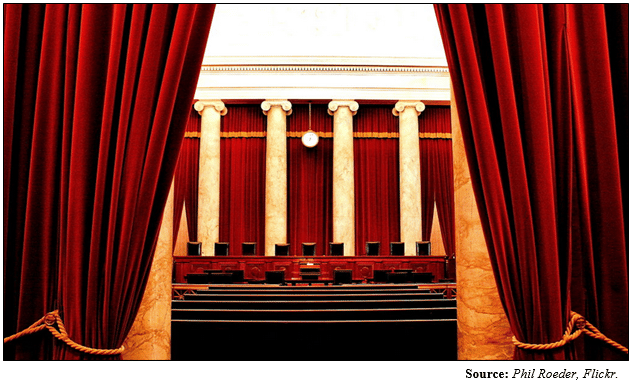The month of June concluded with a historic victory for President Donald Trump and the American people when the Supreme Court effectively dismantled the strategy a network of federal judges has been using to block key elements of the president’s policy agenda in lower courts.
In the landmark case, Trump v. Casa, the Supreme Court ruled in a 6–3 decision that “universal injunctions” used by a network of judges to block elements of President Trump’s executive order on birthright citizenship nationwide exceed judiciary power.
While the case did not overtly address the issue of birthright citizenship, what it did do is empower the president to carry out elements of his executive orders without facing “universal” — or nationwide — roadblocks from the lower courts.
The Supreme Court’s decision limited the use of “universal preliminary injunctions” which a handful of judges from liberal cities have been using for months to block and delay multiple executive orders nationwide issued by President Trump.
In the majority opinion, Justice Amy Coney Barrett noted the distinction between allowing lower courts to issue an injunction providing “complete relief” to specific challengers in a lawsuit, and allowing lower courts to grant “universal relief” to any individual across the country who may be impacted by the executive orders.
At issue was not the content of the executive orders — or even the legal rights of plaintiffs to challenge the executive orders. Instead, the Supreme Court’s decision allows individual plaintiffs and class action groups to present their cases in court, but it denies a network of federal judges the authority to issue sweeping nationwide preliminary injunctions to block President Trump’s executive orders nationwide.
And that is exactly what was happening across the country up until last week as individual judges in liberal cities began issuing universal preliminary injunctions, blocking President Trump’s executive orders on issues such as deporting illegal aliens, halting foreign aid to other nations until that aid could be vetted for fraud and abuse, and halting racial discrimination in university settings.
The Supreme Court’s decision is a decisive victory for the Trump Administration, because it renders obsolete a network of universal injunctions that were setting up roadblocks against key elements of President Trump’s agenda, elements that the American people elected him to fulfill.
While liberals are melting down over the Supreme Court’s decision to limit universal injunctions — with some saying the court has affirmed an “imperial presidency” and other such rhetoric — the thorny issue of lower courts issuing universal injunctions to halt elements of a president’s agenda has been under the microscope for years. It is just that under President Trump, the number of courts issuing universal injunctions to block him skyrocketed, hastening the need for the court to rule on these injunctions.
As two University of Michigan law professors recently recounted in an analysis of the Supreme Court’s decision, the use of universal injunctions by lower courts rose substantially under President Donald Trump compared to past presidents.
Kristin Collins, the James E. and Sarah A. Degan Professor of Law at the University of Michigan and Sam Erman, a professor of law and co-director of the Program in Race, Law, and History at the University of Michigan, noted that universal injunctions have drawn criticism in the legal community for years: “critics have asserted that universal injunctions exceed the federal courts’ equity powers, that they short circuit the process of percolation of legal issues in different federal courts, and that they incentivize plaintiffs to forum shop for the district court most likely to be amenable to their case.”
As to whether the Supreme Court capitalized on this moment for political reasons, the two law professors say that the timing of the court’s decision is “unsurprising”, but more due to the flurry of universal injunctions issued by lower courts in the first few months of President Trump’s second term.
“The timing of this case is also unsurprising”, the two wrote. “Federal courts have issued universal injunctions staying enforcement of policies and orders promulgated by presidents of both parties. However, there have been more universal injunctions issued during President Trump’s first and second terms than during Presidents Bush’s, Obama’s, and Biden’s terms combined. Thus, the Trump administration had a significant incentive to challenge their legality.”
The two professors did speculate that they strongly expect the Supreme Court to rule directly on birthright citizenship “in the fall” of this year and likely issue a decision in the spring of 2026.
Because the Supreme Court did not rule specifically on the constitutionality of each aspect of Trump’s executive orders, there is still room for the court to be forced into making a decision on each issue — birthright citizenship, deportation, federal spending and so on. That said, the court’s ruling is a decisive victory for the Trump Administration and the American people, as it removes a back-channel by which unelected judges were attempting to circumvent key elements of the president’s agenda which the American people elected him to fulfill.
Manzanita Miller is the senior political analyst at Americans for Limited Government Foundation.
The post Supreme Court Curtails Sweeping Universal Injunctions Set In Place To Block President Trump In Historic Case appeared first on Daily Torch.
Click this link for the original source of this article.
Author: Daily Torch
This content is courtesy of, and owned and copyrighted by, https://dailytorch.com and its author. This content is made available by use of the public RSS feed offered by the host site and is used for educational purposes only. If you are the author or represent the host site and would like this content removed now and in the future, please contact USSANews.com using the email address in the Contact page found in the website menu.








